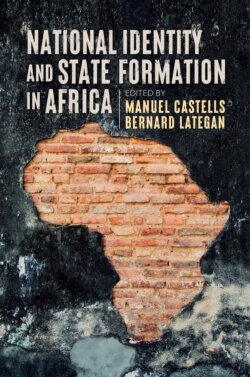Читать книгу National Identity and State Formation in Africa - Группа авторов - Страница 10
Cecil John Rhodes as the epitome of unsettling mobility
ОглавлениеIt is all too easy to forget, in this day and age when countries around the world are increasingly obsessed with detecting, policing and containing human mobility – through chains, agents, cameras, walls and other tools – that there used to be a time when it was free to move. If Africa was the cradle of humankind some four and half million years ago, then it is only proper to remind ourselves that waves of migration out of Africa must have accounted for the presence of humans elsewhere in the world, north, south, east and west of the African continent. It was normal in the deep past, and for centuries subsequently, for people to cross borders without passports and encounter other humans and learn about new resources and perspectives in the course of their travels.
Cecil John Rhodes is known as a consummate colonialist, an imperialist and a foot soldier of the British Empire. He was nimble-footed – like migrants of present-day Africa seeking to cross the Mediterranean into Europe in their quest for opportunities. However, unlike Africans knocking at the doors of Europe in the twenty-first century, mobile Europeans like Cecil Rhodes were backed by colonial powers to unsettle those they encountered in the course of their mobility. Rhodes was able to harness the technologies of dominance of his day to seek and maintain power and privilege for himself and his people. Little or nothing was allowed to stand in the way of this treasure hunter and his ruthless pursuits. As Brown puts it, ‘Rhodes began to feel he had been put on this earth for some greater purpose. He would expand the English-speaking sphere of influence until it was so powerful that no nation would dare oppose it, and war would be a thing of the past’ (Brown 2015: 18). Rhodes was a key pillar in the making of the British Empire, which contributed significantly to the configuration of the modern world (Hyam 1976; Ferguson 2018).
Rhodes proved that a powerful settler, equipped with ‘a good supply of maxims and field-guns’, including ‘a gun called “Long Cecil”, of which the shells were inscribed With compliments C. J. R.’ (Plomer 1984 [1933]: 78, 150; see also Jourdan 1910: 120–2), and with ruthless indifference to the humanity of others, can become a native and the native a settler (Roberts 1987: 226–41; Plomer 1984 [1933]: 74–82). Simply by defining and imposing himself and his race as superior, Rhodes denied the native sons and daughters he encountered any claim to civilization. He limited aspirations for equality to those certified to be civilized by British gendarmes of value and taste, for in Britain, in his own words, ‘the finest race in the world’ was to be found (Van der Westhuizen 2007: 15, 58).
In an enabling environment, Rhodes let his childhood fantasies run wild, and he turned the world into one big fantasy space. His mobility and ambitions of dominance made nonsense of the age-old idea of civilization as the acquisition and resolute defence of a bounded sense of values. His mobility made settlers of natives and natives of settlers. Unlike his mobile African counterparts of the twenty-first century, Rhodes did not have to endure the inconvenience of respect for his host communities, let alone be categorized as coming from a backward, despicable country. His limited knowledge of local cultures was tied to self-serving purposes (Stent 1924: 59–60).
Whatever he lacked, however, did not stand in the way of his nose for diamonds and gold, nor his craving for immortality. He mobilized and unsettled local populations to dig and forage for diamonds. He had a reputation for having little use for human tools that he could not sharpen for his purposes. He disciplined and punished locals by transforming them into labour zombies – mostly through the use of colonial taxes, which he described as a gentle stimulus to make blacks work and remove them from what he termed a life of sloth and laziness (Hyam 1976: 298). According to Flint, ‘Desperate for labor as the mines grew deeper, he used blacks ruthlessly, penning them up in compounds, destroying their family and tribal life, and giving them wages that made them little better than slaves, so creating the economic base of apartheid’ (Flint 1974: xv).
Rhodes partook of an imperial British appetite for swallowing up continents and eating up countries. He generously submitted himself to the arrogance of believing that anyone who can stand their ground is entitled to keep it, and that Englishmen have a divine right and mission to control Africa, and indeed the world. This ambition intoxicated him, and he would not relent until the birth of Rhodesia, a country named after him. The advent of Rhodesia was proof of his power to turn natives into settlers and settlers into natives. Of a power to define, redefine, rename and reconfigure with impunity. In the words of Jourdan, one of his most loyal personal assistants, Rhodes was ‘wedded to Rhodesia with a devotion equal to that of the most ardent bridegroom’ (Jourdan 1910: 219).
With dreams of building a British African empire stretching from the Cape to Cairo, Rhodes had an unquenchable thirst to humble every native encountered. His appetite grew with each new conquest. Rhodes dispossessed natives, and those whose migration had preceded his, of their land and its resources. He also set about reconfiguring the land and its occupants in his image, dictating taste, beauty and decency – in the manner of a priest who symbolically sprinkles water on a convert and renames him or her in the miraculous act of baptism.
